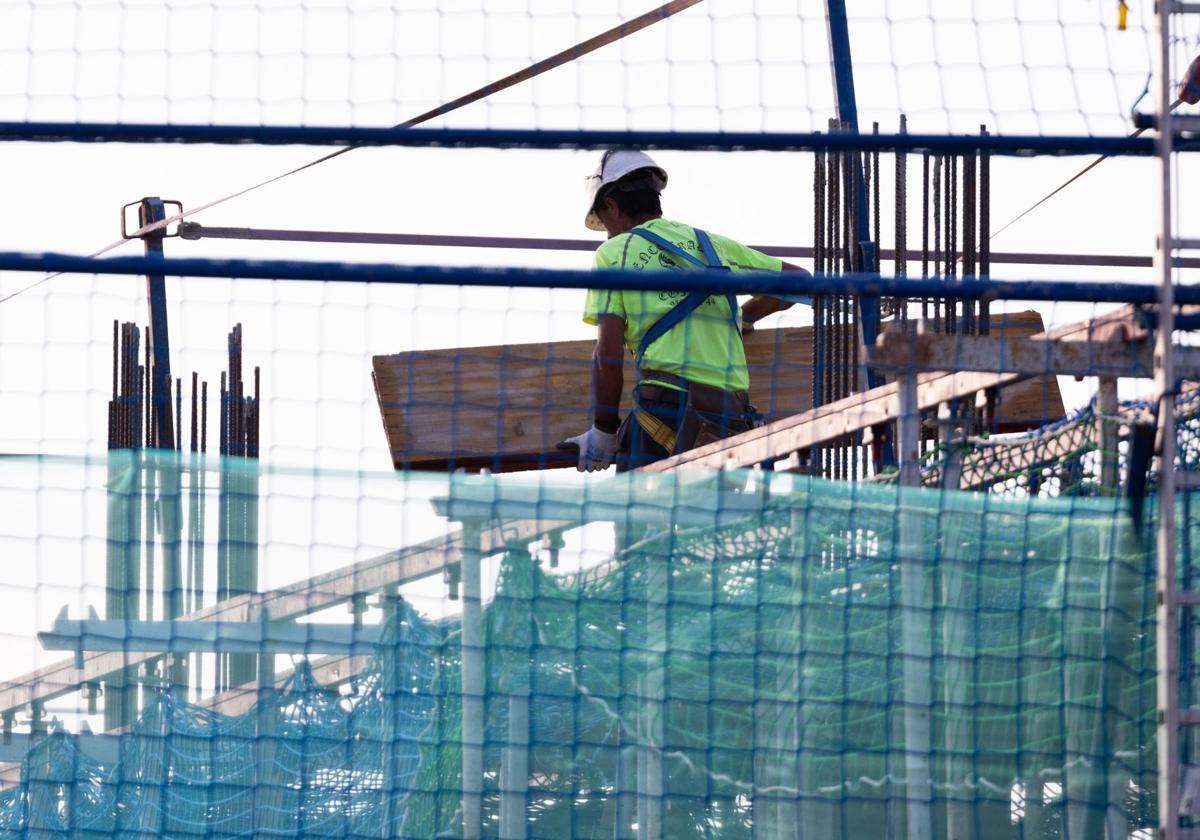Shortage of key workers causes construction delays throughout Malaga and along the Costa del Sol
The employers' association for this industry puts the rshortfall at around 13,000 in the province - largely due to a lack of younger people joining the trade
The shortage of workers in the construction industry is now so acute that it is causing delays and stoppages on building sites throughout Malaga province. The ACP trade association Spain for builders and developers in Spain estimates that the sector could currently employ 80,000 people in the province, which is 13,000 more than the current workforce, according to the latest Social Security affiliation data. "Our sector is ageing, young people aren't being recruited and the reality is that today we lack qualified personnel at all levels," said Violeta Aragón, the ACP's secretary-general. The average age of workers in the sector is now over 45.
This shortage of professionals ranges from the technical levels, where site managers and supervisors with salaries exceeding 40,000 euros are highly sought-after, to all the different trades involved in the construction process: bricklayers, formworkers, plasterboard installers, metalworkers, crane and heavy machinery operators, assemblers, painters, plumbers, electricians and plasterers, among others.
"It is difficult to find any kind of crew," said Aragón. She acknowledged that, in many residential building projects, it has become "difficult" to meet delivery deadlines, as work teams are in high demand and it is not uncommon for work stoppages to occur due to the unavailability of one or more of the links in the construction production chain.
The labour shortage is widespread, although civil engineering projects are much less affected as the prices paid in this area are higher and contractors have more budgetary leeway to ensure they have the necessary crews. Residential building projects, which are also booming on the Costa del Sol and in the provincial capital, are the ones suffering most from the labour shortage.
Violeta Aragón warns that, at a time when there is a social outcry over the need to build affordable housing, the lack of personnel only increases construction costs, "firstly, because time is money on a building site and, if the completion deadline is delayed, costs increase; and secondly, because the law of supply and demand drives up subcontractor rates and workers' salaries."
The traditional and most common way of operating in the bricks-and-mortar business means that construction companies only have a small team of regular employees, usually those with the main technical skills. Then what they do is subcontract the companies and crews needed to complete construction phases. Very few construction companies have enough of their own staff to be capable of taking on a project from start to finish so, at this time of high activity, there is fierce competition among them to hire crews.
Fewer workers from outside Malaga
Aragón went on to explain another factor that exacerbates the labour shortage: Malaga used to attract many construction workers from other provinces across Andalucía. Now, however, this flow of labour has slowed off significantly as construction has also revived in these workers' home towns. Furthermore, the severe housing shortage in Malaga makes it difficult for these skilled workers to come.
As spokesperson for the ACP, Aragón admitted that being unable to attract young people to the construction industry is a real problem. She believes that there persists a negative image of the building trade among the youth despite the fact that, in her opinion, the different trades in construction have several advantages. She provided some examples: "The construction collective agreement is quite good, salaries are higher than in other sectors and the work schedules allow for work-life balance: during the week you finish at 6pm, you leave early on Fridays and you don't work weekends. In addition, the sector has evolved a lot and the jobs are not so physically demanding, as a lot of machinery is used."
Pedro Fontalba, the CCOO trade union's main representative for the construction industry in Malaga, believes that this poor image of the bricks-and-mortar trade is influenced by "the continuing high rate of work-related accidents." He also criticised the lack of compliance with risk prevention measures in some companies: last year there were 390 reported infringements by the Labour Inspectorate in Malaga.
Pilot project to regularise migrants being trained in high-demand trades
The ACP has been in talks with the Ministry of Labour about opening up the recruitment of skilled construction workers from their country of origin. To this end, construction-related trades have begun to be added to the list of occupations that were hard to fill over the last year. However, Violeta Aragón points out that it is not a straightforward task: each company must travel to the country in question and undertake the search for personnel, with the added difficulty of the housing situation in Malaga. The Junta's regional office for employment is exploring another avenue: training undocumented immigrants in highly sought-after professions, as with construction, so that they can obtain their papers and gain legal status by means of socio-educational settlement. This is the pilot project proposal recently presented by the delegation led by Carmen Sánchez. The proposal is to create a 'provincial forum for the integration of people of migrant origin'. The forum will also include the SAE (the Junta's employment office), the regional office for social inclusion, the regional immigration office, various business associations and NGOs. The project consists of organising at least one level 1 training course (which does not require a minimum level of education) in each of the province's productive sectors (including construction) every year at the Remedios Rojo vocational training centre. Through various channels, undocumented immigrants will be informed of the possibility of taking one of these courses and thus obtaining residency via the "arraigo" route with this training. For example, a course on concreting, another on auxiliary operations for electrical grid work and another on plumbing and air-conditioning installation and repairs.



Comentar es una ventaja exclusiva para registrados
¿Ya eres registrado?
Inicia sesiónNecesitas ser suscriptor para poder votar.